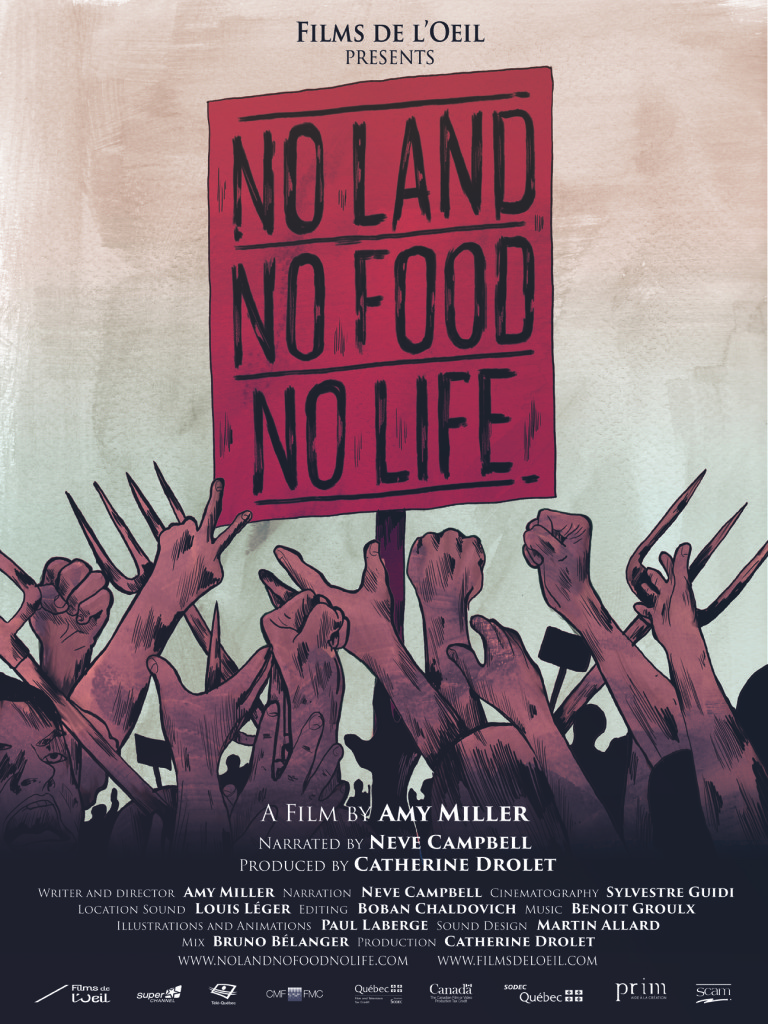 No Land No Food No Life is a hard-hitting film which explores sustainable small scale agriculture and the urgent call for an end to corporate global land grabs. This feature length documentary gives voice to those directly affected by combining personal stories, and vérité footage of communities fighting to retain control of their land.
No Land No Food No Life is a hard-hitting film which explores sustainable small scale agriculture and the urgent call for an end to corporate global land grabs. This feature length documentary gives voice to those directly affected by combining personal stories, and vérité footage of communities fighting to retain control of their land.
Writer & director Amy Miller is a media maker and social justice organizer based in Montréal. She recently directed and wrote the documentary No Land No Food No Life a hard-hitting film on the economy, agricultural land grabs and the changes to farmers’ lives around the world. She directed, wrote and co-produced The Carbon Rush, a global exposé on how carbon offset projects impact local peoples. She made the featurette documentary Myths for Profit: Canada’s Role In Industries of War and Peace which was screened among others at the Milano Film Festival, RIDM and The Bay Street Film Festival, where it won the People’s Choice Award.Her first documentary, Outside of EUrope, focuses on the exclusionary nature of immigration and border policies and continues to be screened around the world. She remains dedicated to developing critical documentaries for transformative social change and helping out grassroots campaigns for justice.
Director’s Intentions
“With No Land No Food No Life I wanted to take a deep look at resource management and one’s ability to have control over the most vital of needs – access to growing food. Global food production is increasingly becoming concentrated by a handful of huge multinationals, not only impacting people ‘over there’ but also ‘right here’.
“I believe that if people knew what was happening they would be concerned and want to take action, not only to create a more just and equitable world, but also in their self- interest to access food. We are not talking about an issue that people can simply dismiss and suggest that it does not impact them. In 2008 and most recently throughout 2011+2012, global grain stocks have skyrocketed and people in the Global South could not afford to make or purchase bread due to the sudden high cost of wheat; riots erupted in over 40 cities in over 20 countries. Land grabs will only exacerbate the problems surrounding the ongoing food crisis.
“Increasingly, points of view that ask why the world functions as it does are difficult to come by primarily due to financial restraints, rather than a lack of interest shown by the audience. My experiences with my documentaries The Carbon Rush, and Myths for Profits showed me that many people very much want films that are critical and engaging.
“Many of the ways I present ideas in my documentaries are rooted in Paulo Freire’s ideas surrounding popular education which emphasized the need to provide native populations with an education which was simultaneously new and modern (rather than traditional) and anti-colonial (not simply an extension of the culture of the colonizer). My documentaries are inspired by the critical pedagogy movement that Freire and others such as contemporary Henry Giroux have developed: guided by passion and principle, to help audiences develop consciousness of freedom, recognize authoritarian tendencies, and connect knowledge to power and the ability to take constructive action.”
Amy Miller
Cinema Politica: No Land No Food No Life | Friday Oct. 23, 2015 | 180 St. John St., Fredericton | 7 p.m.




